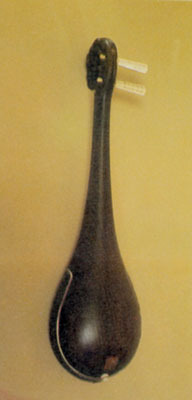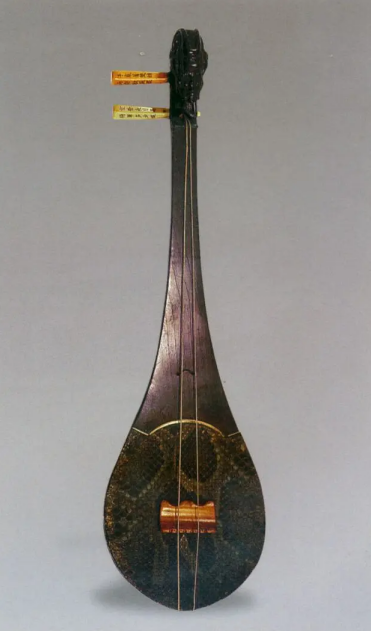The history of Xiaohulei
Tang Dynasty
From the beginning of the establishment of the Middle Ages, through Xingyuan, Zhenyuan, Yongzhen, Yuanhe, Changqing, to the 45 years of the second year of Baoli, Xiaohulei has been hiding in the inner palace. At the time of Emperor Wenzong Li Ang in Tang Dynasty, there was a palace man, Zheng Nv, who was good at playing Xiao Hu Lei, and it only began its prosperous period. "Yuefu Miscellaneous Records" records: "In the Wenzong Dynasty (AD 827-835), there was an inner man Zheng Zhongcheng, who was good at huqin.There are two pipa in the inner library, the big and the small Hulei. Zheng Chang played Xiao Hu Lei, and occasionally took off the key and sent it to the Nanzhao family in Chongren Fang for repair. About making musical instruments, all of them are in this workshop, and the two Zhao families in the south and the north are the most wonderful. "The following also talks about the old official Liang Houben, who was fishing in the Weishui River, and suddenly saw something floating in the river, which made the family boy catch up. It was a murdered woman and a small thunder. Liang Houben accepted the woman as his wife. , every midnight, Liang will play Xiao Hu Lei gently. The play "Little Hu Lei" is probably based on this historical fact.
In the ninth year of Taihe (AD 835), there was a massacre in the palace. Emperor Wuzong Li Yan succeeded to the throne. He complained about Wenzong, hated Shiliang, and brought disaster to Yuefu. All musicians and servants who were favored were punished and punished. De Yuefu was empty, and Xiao Hulei didn't know where to go.
Early Qing Dynasty
Time is like an arrow. In the past 856 years, in the 30th year of Emperor Kangxi in the early Qing Dynasty (AD 1691), the famous poet Kong Shangren (Haoantang, Dongtang, 1648-1718), a famous poet in the Qing Dynasty, stumbled across the market in Beijing. Little Hulei. Due to the lack of silver, he took off his clothes and pawned them and collected enough silver to get them.Kong Shangren is the sixty-fourth generation grandson of Confucius. After Kong's acquisition of Xiaohulei, he made a textual research on him for three years, and cooperated with the famous writer Gu Cai at that time to compile a legendary drama "The Legend of Xiaohulei". Kong Shangren praised the famous pipa master Fan Lu (Kwantung) at that time. He wrote in the front of "Legend of Little Hulei": "Fan Huapo (that is, Fan Zhu) in Yuncheng, playing the pipa to get divine solution. Occasionally, it is shown as Xiao Hulei , start to caress, as if meeting an old thing.
The self-made Shang tunes "Indus Rain" and "Frost Anvil" are two pieces, which touch people's thoughts. "The poet Zha Si (Wang Piao) in the early Qing Dynasty wrote in "Listening to Guandong Passengers Playing Little Hulei on the Seat of Kongdongtang": "Liangzhou Suoxiang is arrogant, and suddenly the hairspring turns green waist. The broken column is shocked by thunder and the guests wake up, and the whole room is full of wind and rain." Poems describing Fan Yu's playing skills and Xiao Hulei's artistic charm, as well as Tian Wen's "Little Hulei Song", etc.

spread around
According to the "Wan Xue Ji" written by the literati Gui Fu (word Wei Gu) of the Qing Dynasty, in the fifty-seventh year of Kangxi (1718 AD), after Kong Shangren died, his son brought the qin into the capital and left it in Daozuo, where he was acquired by Wang Dounan. . Before the thirty years of Qianlong's reign (1765 AD), the Wang family gave Xiao Hulei to Kong Siyuan again. Later, it was transferred from Yitangan in Jiaxing to the collection of relatives in Jichang in Guilin.In the 25th year of Jiaqing (1820 AD), Jichang presented Xiao Hulei to Liu Yanting, a famous scholar in Zhucheng, Shandong. In the 19th year of Daoguang (1839 AD), Liu married a daughter, and Xiao Hulei, as a dowry, returned to Zhuo of Huayang. All sea sails. In the second year of Xuantong's reign (1910), Liu Shiheng (1863-1926), a scholar from Guichi, Anhui Province, bought this qin from the Zhuo family in Beijing, named it "Xiaohu Lei Ge", and invited the modern writer Lin Shu (1852-1924) wrote "Pillow Thunder", and he also wrote "Xiao Hulei Legend".
After Liu Shiheng's death, the clan member Liu Zihe claimed to have a debt with him, and kidnapped Xiao Hulei and sold it to a British businessman. Later, it was owned by Liu Huizhi, a famous collector in Nanxun, Huzhou, Zhejiang. In the early 1950s, the National Cultural Relics Department acquired this ancient musical instrument, Xiao Hulei, which has been circulated among the people for more than a thousand years, from the old man Liu, and transferred it to the Palace Museum for collection. This rare treasure has been included in the large-scale picture book "Chinese Musical Instruments Illustrated Guide".
In the Yuan Dynasty, Hulei, also known as Huqin and Erxian, was a musical instrument played by the Mongolian people on horseback. In the book "General Examination of Literature", it is included in the category of pipa, and it is called "Hulei Pipa". Gui Fu's "Evening Learning Collection" said: "Fan Lu, a guest of Kongdongtang, can play Xiao Hu Lei, and is good at playing "Autumn Palace" and "Autumn Wall". String pipa, many keys are not passed down, but now I know that Huang Zhong changes the key." Unfortunately, Hu Lei's score has long been lost.

Late Qing Dynasty and early Republic of China
At the end of the Qing Dynasty and the beginning of the Republic of China, there were more and more folk productions. According to Mr. Liu Shiheng and Sun Liu Chongguang, "In the early years, a craftsman had made two copies of Xiaohulei, and the two characters 'imitation' were engraved on the piano for easy identification." In the 1930s, the famous folk music group Datong Concert in Shanghai , In order to promote and develop the cause of national music, under the advocacy of the chairman Zheng Jinwen, various musical instruments of ancient and modern China have been produced.Miao Jinlin, Luo Songliang and other highly skilled people directly participated in the design and production. Among them, there is a small Hulei. The shape is significantly different from that of the Tang-made Hulei. The head is in the shape of a square column, with a flat top and no decoration.
This little Hulei once participated in the band ensemble organized by the concert at that time. It is a pity that this little Hulei failed to spread to today due to the chaos of war. However, this type of sudden thunder is still circulating in Jiangsu and Zhejiang areas. It is made of fragrant mahogany and used for instrumental music such as Jiangnan silk and bamboo. And loaded into the "Chinese Musical Instruments Illustrated" large-scale album.
 渝公网安备 50010702504639号
渝公网安备 50010702504639号